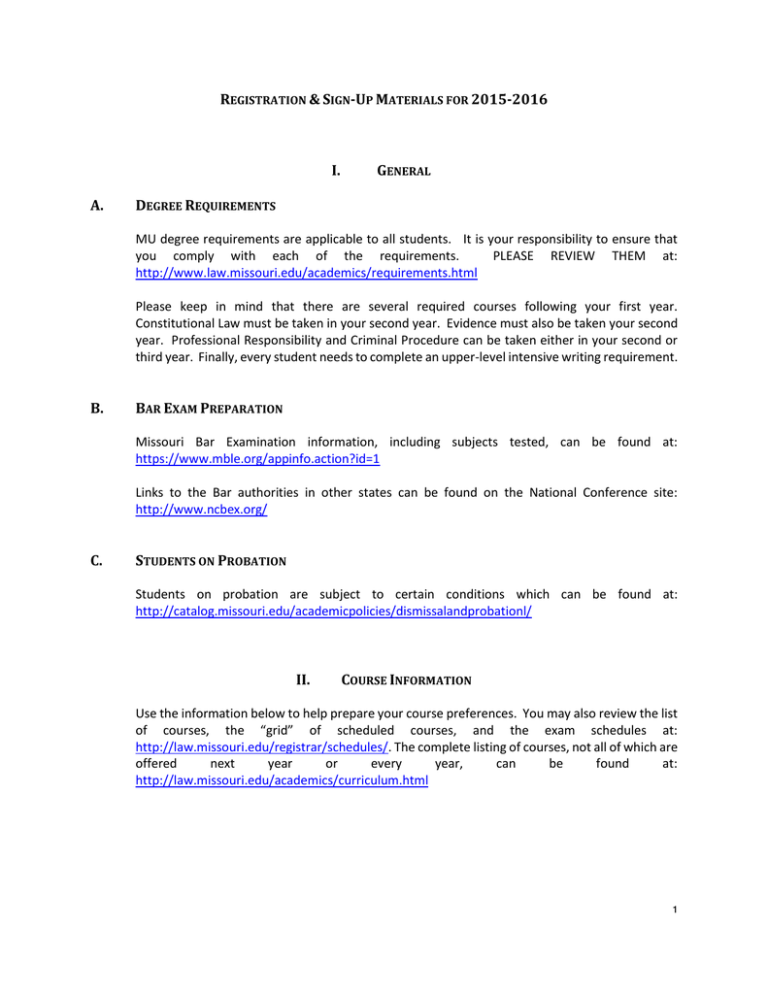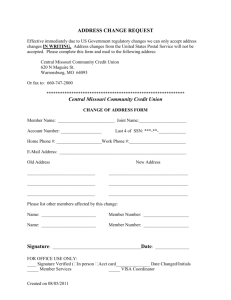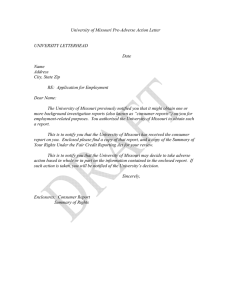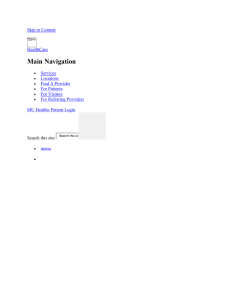R & S
advertisement

REGISTRATION & SIGN-UP MATERIALS FOR 2015-2016 I. A. GENERAL DEGREE REQUIREMENTS MU degree requirements are applicable to all students. It is your responsibility to ensure that you comply with each of the requirements. PLEASE REVIEW THEM at: http://www.law.missouri.edu/academics/requirements.html Please keep in mind that there are several required courses following your first year. Constitutional Law must be taken in your second year. Evidence must also be taken your second year. Professional Responsibility and Criminal Procedure can be taken either in your second or third year. Finally, every student needs to complete an upper-level intensive writing requirement. B. BAR EXAM PREPARATION Missouri Bar Examination information, including subjects tested, can be found at: https://www.mble.org/appinfo.action?id=1 Links to the Bar authorities in other states can be found on the National Conference site: http://www.ncbex.org/ C. STUDENTS ON PROBATION Students on probation are subject to certain conditions which can be found at: http://catalog.missouri.edu/academicpolicies/dismissalandprobationl/ II. COURSE INFORMATION Use the information below to help prepare your course preferences. You may also review the list of courses, the “grid” of scheduled courses, and the exam schedules at: http://law.missouri.edu/registrar/schedules/. The complete listing of courses, not all of which are offered next year or every year, can be found at: http://law.missouri.edu/academics/curriculum.html 1 A. COURSE PREREQUISITES Course prerequisites are listed on the web page listing for each course. Please review them carefully as you will not be able to register for certain courses if you have not met the prerequisite(s). B. COURSE ENROLLMENT CAPS AND ENROLLING IN CLOSED COURSES When you go to MyZou, you will see the enrollment cap limits for each course. There are NO wait lists. As students drop courses, the online registration will indicate that there are spaces available in the course. You can create a “wish list,” but your “wish list” will not automatically enroll you if an opening is created. YOU MUST CHECK ON COURSES REGULARLY TO DETERMINE IF THERE IS AN OPENING. C. COURSES OUTSIDE OF LAW SCHOOL THAT YOU MAY WISH TO CONSIDER Law students in good academic standing are permitted initially to take up to three (3) hours of study outside the law school provided that the course is related to your field of study and provided the course is at the graduate level or above (courses numbered 7000-9999). Requests to take a course outside the law school must be presented to the Associate Dean for approval. After taking these initial three (3) hours of non-law courses, students can petition the Associate Dean to take up to an additional three (3) hours of coursework outside the law school. Such petition will be granted upon a showing that the coursework is relevant and valuable to the student’s academic and professional goals. D. SPECIAL ISSUES CONCERNING EXISTING COURSES Advanced Trial Practice (Prof. Henson) As in prior semesters, please notice that Trial Practice is a pre-requisite for this course. As of 2015, the Intersession Session of Trial Practice will not satisfy this requirement. Students planning on taking Advanced Trial Practice will have to enroll in either the summer or semester sections of Trial Practice. Please note that students who took Intersession Trial Practice in 2014 are grandfathered and thus are eligible to take Advanced Trial Practice. Business Organizations (Fall; Professor Barondes) The Fall section of Business Organizations (taught by Professor Barondes) will have a significant experiential component and will include a number of transactional skills exercises. Because some portion of skills exercises may be used in subsequent years, students will be required to keep confidential (and not share with students in subsequent years) information concerning skills exercises in the class. 2 The skills exercises may involve working in teams, which may include in-class work. In-class exercises will require at least one member of a team have a laptop in class. In-class exercises will require at least one member of a team have a laptop in class. Because grading will be based in part on in-class exercises and that activity cannot be made-up outside class, student attendance will be mandatory for class meetings where in-class exercises will be held. Only a minority of the scheduled class meetings will involve these in-class exercises. An attendance policy customary for a lecture-based class will apply to the majority of the class meetings. This section of Business Organizations will be offered for 4 credit hours in Fall 2015. Complex Litigation (Spring) & Topics in Complex Litigation: Mass Torts (Summer) Students will be allowed to enroll in either or both of these courses. In other words, enrollment in one does not preclude enrollment in the other. Constitutional Law & Evidence These two courses must be taken in your second year. In the 2015-16 year, Constitutional Law, like Evidence, will be offered in both semesters. Criminal Procedure & Professional Responsibility These two required courses can be taken either in your second or third year. Deal Skills (Spring; Prof. Newman) The prerequisites for this course have been expanded to include either Business Organizations or Contract Drafting. Death Penalty (Fall; Prof. Litton) This course will be offered as a 2-hour seminar next fall rather than with an experiential component. The experiential component will, however, be offered in future years. Gender, Race, Sexuality and the Law (Fall; Prof. Alexander) Formerly titled “Gender & the Law” this class has been renamed to better reflect the course coverage, which involves viewing the law and its effects on various “outsider” groups as well as the many intersections among those groups. This course will be offered as a writing credit course. Judicial Externship (Fall; Prof. Dessem) Because some courts schedule few proceedings on Fridays, those interested in the Judicial Externship Seminar should attempt to keep a day other than Friday relatively open to spend time at the courthouse. Landlord/Tenant Practicum & Trial Practice If you are enrolled in these classes as of 5:00 p.m. on the day prior to the First Day of class for a semester (or at 5:00 p.m. on Nov. 21st in the case of Intersession Trial Practice), you will NOT be permitted to withdraw after that date (except for “good cause” arising later in the semester, to be solely decided by the faculty teaching the course). In other words, if you are enrolled in one of these courses as of the above time, you will receive a grade for the course. 3 Trial Practice (Intersession; Prof. Henson) Students are advised that Trial Practice may not be offered in the Intersession in the near future after the January 2016 Intersession. Sufficient sections to satisfy student interest will be offered during the semester or summer in the event it is not offered in the Intersession. E. EXPERIENTIAL LEARNING OPPORTUNITIES Clinics: The Law School offers several opportunities for students to work with clients under expert supervision, including a Criminal Clinic taught by Prof. Kandice Johnson; the Family Violence Clinic taught by Prof. Mary Beck; the Legislative Practicum taught by Prof. Dan Hall; the Mediation Clinic taught Prof. Jim Levin; the Landlord/Tenant Practicum taught by Prof. Michael Carney, and the Veterans Law Clinic taught by Prof. Angela Drake. Each of these clinical experiences can be taken only one time. Information is available at: http://law.missouri.edu/academics/clinical.html The Law School will offer a new clinic, the Entrepreneurship Clinic, next year. Entrepreneurship Clinic is described more fully in the new courses section below. The Externships: The externship program is available each semester. Only students who have completed their first year of law school and are in good academic standing can register for the Externship course. Externs must attend two class meetings at the beginning of the course and five class meetings at the end of the course. During the fall and spring semesters those class meetings will be arranged by the instructor. For summer sessions, class meetings will be scheduled at the end of the spring semester and the beginning of the fall semester. For three credits, externs will work for a total of 150 hours at the placement sites of their choice where they will be supervised by attorneys and judges who have agreed to serve as mentors. For two credits, externs will work a total of 100 hours at their placement sites. Students will be permitted to register for the Externship during two or three semesters or summer sessions. Students can earn no more than three externship credits during any one semester or summer session. Students cannot take more than 6 hours of Externship credits. Credits earned in the Landlord/Tenant Practicum count toward that 6-hour Externship limit. Graded S/U. In the Fall 2016 semester one of the Externship sections will be focused exclusively on externs with placements as judicial clerks. As with the regular Externship Program, the Judicial Externship offers students an opportunity to develop some of the skills necessary to bridge the gap between law school and law practice. Students undertaking the Judicial Externship, however, all will secure placements with a state or federal judge. The work of Judicial Externs will consist primarily of research and writing for the judge and his or her judicial law clerks, and externs should have the opportunity to attend hearings, draft opinions, and perform administrative and other duties within the judge’s chambers. The arranged class meetings at the Law School will focus on the special duties and responsibilities of both judges and their clerks and the unique roles that both 4 of them play within our legal system. Through the Judicial Externship, students prepare for "effective and responsible participation in the legal profession" (ABA Std. 301) by applying the core concepts learned in law school courses to the challenges presented in the actual practice of law. In the Summer 2015 one of the Externship sections will focus on students who are interested in extern in Jefferson City doing government work. The section will be taught by Mr. Jack McManus. Mr. McManus, who works at the Missouri Attorney General’s Office will assist students in finding placements with government agencies in the capital city, and meet with students during the summer to discuss their experiences. Innocence Project: The School of Law is part of a joint innocence project involving the UMKC Law School, the MU School of Journalism and a non-profit group The Midwestern Innocence Project. Innocence Project at MU is supervised by Prof. Rod Uphoff and Laura O’Sullivan of UMKC and is available to only 8 students in the Spring semester. Wrongful Convictions, a fall course, is a prerequisite. Information about the Clinic can be found at: http://themip.org/. F. INDEPENDENT RESEARCH Independent Research with a faculty member is available during the Summer, Fall and Spring Semesters. Credit is earned at the rate of 20 pages per credit hour. No more than three hours of Research may be taken or counted toward the law degree. Enrollment in Independent Research may, but need not, be structured so as to satisfy the upper-level writing requirement. There is a 3 hour limit on the number of hours you may take as Independent Research. Students are responsible for identifying the faculty member who will serve as a supervisor. The student and the faculty supervisor will agree on the number of hours in which the student will enroll. The student will then consult with Denise Boessen to process the enrollment. G. PASS/FAIL COURSES (S/U) Students may not choose to take a class pass/fail. The faculty decides whether a course is to be conducted on a graded basis (65-100) or on a satisfactory/unsatisfactory basis. Most courses are graded. If you have a question about whether the course is graded, you should ask the instructor. There is no limit on the number of S/U hours that a student may have. III. STL SUMMER PROGRAM This year will be the second year of our Summer St. Louis Program. The program allows students to earn course credit during the summer in a major metropolitan area where they can work during the day while taking evening/weekend classes. This year we will offer second and third year law 5 students an exciting opportunity for intensive study of cutting-edge topics. In addition, students enrolled in the program will also have the opportunity to participate in a number of networking opportunities with the school’s extensive St. Louis alumni base. Courses will be taught in sequence at UMSL’s modern classroom facilities close to downtown St. Louis or on location at certain law firms. Students may choose to take selected courses or the entire set. Dates May 26 – May 30 Course Privacy Law (1 credit) June 1 – July 1 Criminal Tax Enforcement (2 credits) Jury Instructions and the Trial Process (2 credits) June 6 to July 11 June 4 to July 9 Basic Business Principles for Lawyers (2 credits) Meeting times T to F (6 to 8:00), S 912:40 Armstrong Teasdale M & W (6 to 8:20), UMSL, Clark Hall 400 Exam TBA Sat (8-noon) (no class July 4), Tues, June 23 (6-9:20), UMSL, Clark Hall 400 Th (6 to 9) & T, June 9 (6-9) & T, June 30 (68:20), Capes, Sokol, Goodman & Sarachan, P.C. No exam IV. A. No Exam TBA FACULTY FULL-TIME AND ADJUNCT FACULTY You can find biographical information http://law.missouri.edu/faculty/directory/. on most members of the faculty at: In addition to our permanent faculty, the law school regularly asks a handful of highly qualified Adjunct Professors to lend us their expertise each year. The law school has some “permanent” visitors including Ray Phillips, retired from the faculty of the University of Georgia, and Bill Fisch and Peter Davis, retired from our own faculty, all of whom will assist in working with you. You can find biographical information about the adjunct faculty at: http://law.missouri.edu/faculty/directory/adjunct-directory.html B. NEW FULL TIME FACULTY Professor Robert Jerry – Professor Jerry returns to the University of Missouri School of Law after serving as Dean and Levin Mabie and Levin Professor of Law at the Levin College of Law at the 6 University of Florida. Prior to serving at the University of Florida, Professor Jerry served as the Floyd R. Gibson Missouri Endowed Professor of Law at the University of Missouri School of Law, the Herbert Herff Chair of Excellence in Law at the University of Memphis, Cecil C. Humphreys School of Law, and as Professor and Dean at University of Kansas School of Law. Professor Jerry is a national expert on insurance law and has served as an ALI advisor regarding liability insurance and well as on numerous uniform and national commissions. He will teach several courses related to insurance law as well as Lawyering. C. NEW ADJUNCT FACULTY Thomas Albus - Tom Albus is an Assistant United States Attorney in the White Collar Section of the United States Attorney’s Office for Eastern Missouri. Prior to joining the U.S. Attorney’s office, worked in the litigation department of Bryan Cave LLP and as a law clerk to Judge John C. Holstein of the Missouri Supreme Court. Laura Krebs Al-Shatir - Laura Al-Shathir is an associate at Capes Sokol Goodman & Sarachan, specializing in tax and business planning advice in corporate transactions, including selection and formation of business entities, acquisitions, expansions, employee benefits and executive compensation, redemptions of ownership interests, and dissolutions and terminations of businesses. She also represents clients in tax audits and appeals and in litigation before the U.S. Tax Court. Daniel Nelson - Dan Nelson is a partner at Armstrong Teasdale and co-leader of the firm’s Privacy and Data Security practice. He works in the area of commercial litigation and information security and privacy law, representing clients in commercial cases trade secrets, contracts, securities, corporate governance and legal malpractice matters. Mr. Nelson is a Certified Ethical Hacker (C|EH) through the EC-Council and a Certified Information Privacy Professional (CIPP/US) through the International Association of Privacy Professionals. James Niemann – Jim Niemann served for several years as counsel at Assurant, including roles as (i) regional director of government relations and lobbying to promote and expand company opportunities, (ii) business unit general counsel for multiple Assurant business entities, and (iii) chief counsel for the Assurant Solutions New Product Development team, which required managing the Company’s IP portfolio with an outside law firm and also educating internal legal and business leaders on intellectual property law. After leaving Assurant, he has advised multiple innovators and start-up ventures, including serving in a primary legal counsel role advising a complex technology start-up in the banking/lending arena. William Ohlemeyer – William Ohlemeyer is a partner at Boies, Schiller and Flexner, where his practice involves complex commercial litigation and product liability, with an emphasis on mass torts, class actions, and federal multidistrict litigation. Mr. Ohlemeyer was formerly Vice President and Associate General Counsel of Altria Group, Inc., where he coordinated the litigation facing the Altria group of companies. Mr. Ohlemeyer is an adjunct faculty member at Columbia Law School where he teaches a course on Mass Torts. 7 Alasdair Roberts – Professor Roberts joins the Truman School of Public Policy at the University of Missouri this summer after serving as a professor of law and professor of public policy at Suffolk University. He has a vast background in public policy and public administration. For more information on Professor Roberts see http://truman.missouri.edu/2015/01/truman-schoolbuilds-faculty-with-appointment-of-alasdair-s-roberts/. V. REGISTRATION FOR THE SUMMER SESSION All Registration will be done online. Go to: https://myzou.missouri.edu/psp/prd/?cmd=login and enter your Pawprint. Then, click on “Self-Service” and you will get to the registration section. Summer registration begins at 7:00 A.M. on Tuesday, April 7. VI. REGISTRATION FALL & SPRING A. GENERAL INFORMATION All Registration will be done online. Go to: https://myzou.missouri.edu/psp/prd/?cmd=login and enter your Pawprint. Then, click on “Self-Service” and you will get to the registration section. B. DATES AND TIMES For incoming 3L students, registration for both Fall 2015 and Spring 2016 will begin at 7:00 a.m. on Wednesday, April 8. For incoming 2L students, registration for both Fall 2015 and Spring 2016 will begin at 7:00 a.m. on Thursday, April 9. Once registration is open for your group, you may register at any time thereafter. C. COURSES REQUIRING STUDENT SPECIFIC PERMISSION Enrollment in some courses requires specific permission. To enroll, student will need to work with Denise Boessen in 203. Courses requiring specific permission will be identified in MyZou accordingly. 8 D. CHANGES TO THE COURSE SCHEDULES Please be aware that circumstances could arise which might require the Law School to make changes to the course schedules. Some courses might have to be cancelled due to lack of enrollment or unavailability of the professor. Some new courses might be added and there might be some changes in the professors assigned to any particular course. We will try to minimize the disruptions that those changes might have on your schedule and will work with you to adjust your schedules in case late scheduling changes have to be made. E. RECENTLY ADOPTED COURSES Below is a list of courses which are new offerings: Auto and Homeowners Insurance – (Spring; Prof. Robert Jerry) – 3 credits This course examines advanced topics in automobile insurance and homeowners insurance. Emphasis will be given to policy forms, statutes, regulations, and cases, but a significant portion of class time will involve performance and practice skill exercises in which students work through loss scenarios based on actual cases. The course has a national perspective, but special emphasis will be given to Missouri law. The 3-credit course allocates approximately two-thirds of class time to auto insurance and one-third to homeowners insurance. Prerequisites - Either Insurance Law or Insurance Claims Processing and Dispute Resolution (ICPDR), or in spring 2016 with permission of the instructor. This course will involve a final exam as well as skills exercises. Criminal Tax Enforcement – (St. Louis Summer Program; Mr. Thomas Albus) – 2 credits This course presents an overview of the administrative and legal framework of federal criminal tax enforcement. Students will study the major statutory and case authority governing criminal tax prosecutions and will also review case studies of tax prosecutions brought in Missouri with the agents, prosecutors and defense lawyers who handled them. Students will be expected to prepare and present a legal paper on a criminal tax topic. Entrepreneurship Clinic – (Fall/Spring semesters; Mr. James Niemann) – 3 credits The Entrepreneurship Legal Clinic combines business law issues, intellectual property, and transactional experiential learning. The Clinic explores the lawyer’s role as counsel to entrepreneurs engaged in early-stage ventures. Students will survey the legal and business issues encountered by entrepreneurs and develop the practical skills necessary to effectively represent them, including client interviewing and counseling, entity formation and planning, governance issues, employee issues, intellectual property analysis (except patents [presently]), and contract drafting. Students will work on actual client matters approved by the Clinic’s Supervising Attorney. Students must have the Supervising Attorney’s permission to enroll. The Clinic is graded and enrollment is limited. Prerequisites: Business Organizations and Professional Responsibility (or 9 concurrent enrollment in the latter). Insurance Claims Dispute Resolution – (Spring; Prof. Robert Jerry) – 3 credits This course provides an in-depth examination of claims processing and dispute resolution in the insurance business in both first-party (property, life, etc.) and third-party (liability) insurance. Topics covered include notice of loss, proof of loss, duty to cooperate; appraisal; arbitration; duty to defend; settlement obligations; the role of defense counsel; conflicts of interest; remedies for noncompliance with claims processing obligations; bad faith. The topics will be covered from a national perspective, but special emphasis will also be given to Missouri law. The course will involve a final exam. Introduction to Privacy Law – (St. Louis Summer Program; Mr. Daniel Nelson) – 1 Credit This course will focus on the fundamental principles of privacy and these principles’ implementation in statutes, regulations and case law. Covered topics include: (a) why privacy matters; (b) fundamental privacy principles; (c) scope of “privacy law;” (d) U.S. Federal privacy laws (including HIPAA, COPPA, GLB, FCRA); (e) key State privacy laws (including CalOPPA, Massachusetts’s Data Security Regulation, and overview of breach notification laws); (f) overview of foreign privacy regimes, with a particular focus on European Union’s evolving privacy laws; (g) restrictions on, and methods to accomplish, trans-border data transfer in light of varying laws (e.g. U.S. Safe Harbor, Model Contracts); and (h) key enforcement bodies and selected enforcement decisions. This course will involve a final exam. Law & Public Policy – (Fall; Prof. Al Roberts) – 2 credits This course introduces students to the political and institutional considerations that influence the design and implementation of policy in the public sector. It provides an analytic toolkit for understanding why certain kinds of policies are preferred over others; how legal and bureaucratic arrangements facilitate or undermine new policies; and how entrepreneurs succeed in promoting new policies. It also provides students with the opportunity to learn more about the dynamics of state policymaking through research and discussion with policymakers. The course will involve a variety of feedback measures. Topics in Complex Litigation: Mass Torts – (Summer Program; Mr. William Ohlemeyer) – 1 credit This course will explore aspects of complex civil litigation through the lens of mass torts lawsuits. It will specifically examine issues such as discovery and scientific evidence, alternative liability issues, class action and multi-district litigation, and alternatives to litigation. This course will involve a final exam. 10 VII. REFUND OF FEES Information about refund of fees is available on the MU Cashier’s Website. Make sure you look at the information that applies to the School of Law: http://cashiers.missouri.edu/refund_schedules.htm Please notice that refund amounts are based on the percentage of class length elapsed before dropping. Students dropping classes receive refunds as follows: 0% of the class (i.e. class dropped before the first day of the session) — 100% refund Less than 10% of class — 90% refund 10% - 25% of the class — 50% refund 25% - 50% of the class — 25% refund More than 50% of the class — no refund Thus, if you drop a class after the first day of Law School classes (regardless of when the class you are dropping meets for the first time) you will not receive a full refund. 11






